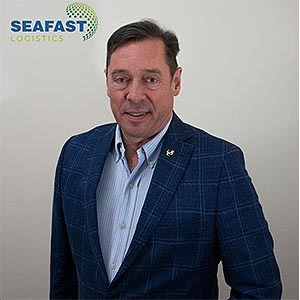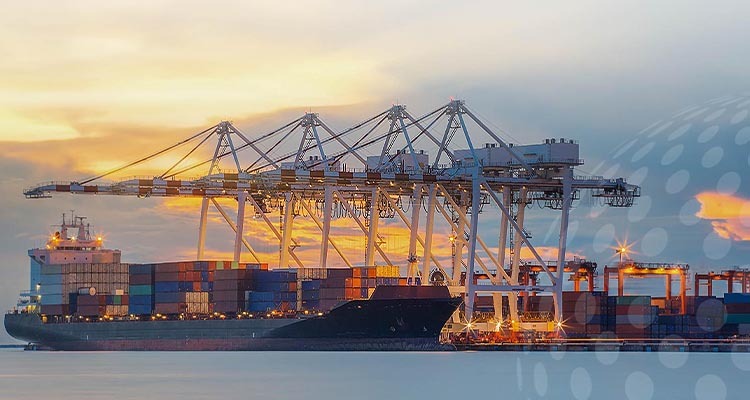Offering complex, specialist services, Seafast Group provides global reach with a personal touch
With over two decades of experience, Seafast Group (Seafast) is a market-leading provider of end-to-end logistics solutions for customers across three core sectors: refrigerated cargo, remote locations, and humanitarian relief. From customs clearance and cargo handling to freight forwarding and warehouse services, Seafast manages all aspects of the supply chain with a focus on bespoke logistical solutions, as opposed to a ‘one-size fits all’ approach like many larger international providers.
Based in Felixstowe, England, the business has earned a reputation for combining its global reach with local knowledge to ensure cargo reaches its destination

quickly, safely, and securely. Formed in 2000, Seafast has evolved into a multi-award-winning service provider with recognition from some of the most respected organizations in the industry, including a Queen’s Award for International Trade.
David Halliday, CEO, joins us to discuss the company’s evolution and how it continues to operate in hard-to-reach areas. “The company was first formed in 2000 and started off performing domestic transportation services for the UK’s Ministry of Defence, along with providing ambient warehousing in Felixstowe and Tilbury,” David opens.
“Shortly afterwards, we received another invitation to tender for end-to-end logistics services from the UK into Iraq, and then at a later date, Afghanistan via Pakistan. However, as a young organization, we were asked to choose between continuing with the Iraq operation or taking on the Afghanistan contract. We chose Afghanistan and went on to win three consecutive contracts spanning a ten-year period between 2005 and 2015, which included returning equipment to the UK.”
Niche markets
On a more personal note, David joined Seafast in 2007 as its sixth shareholder, after spending 26 years in the container shipping sector. “I joined Seafast to help diversify operations as the company moved away from ambient warehousing into a modest temperature-controlled facility within the Port of Felixstowe,” he reflects. “Shortly after investing in Seafast, as expected, a number of the Shareholders retired, and we set course to create a logistics business that looks and feels rather different to our competitors. To do so, we invested in two key areas of the business. Firstly, we exited ambient warehousing and instead embarked on a journey in temperature-controlled logistics services under a cross-docking model, which allowed us to eliminate container demurrage and detention charges on behalf of our customers.
“The other part of the business model we developed was to define our geography as hard-to-reach, sensitive, or emerging markets,” he continues. “This, of course, drew from our experiences in handling non-sensitive military cargo through Pakistan, Afghanistan, and Iraq. We started delivering vehicles to the United Nations and other humanitarian organizations, for example.
“Due to our expertise and experience of operating in remote territories, we were approached by the Falkland Islands to handle their logistics and shipping needs after a large container company had terminated services due to regional politics and risk.”
 Supporting emerging economies
Supporting emerging economies
Despite several challenges in recent years, such as the Covid-19 pandemic and geopolitical tension across the globe, Seafast has maintained a consistent level of success. “We operate a strict business code of conduct to fully research and investigate our ability to fulfil a contract before we agree to it, rather than risk disappointing our valued customers,” David explains. “We try to work in partnership with our customers. For example, after delivering four-wheel vehicles to humanitarian organizations in Kurdistan, Iran, and South Sudan on behalf of a well-known manufacturer, we were asked to consider delivering into Ethiopia, driven by earlier success in other difficult territories.
“However, we conducted field visits, spoke with a range of potential suppliers, and considered how to navigate customs clearance in Djibouti before agreeing to take on this new territory. The regions in which we operate are complex and require thorough research and understanding; we must be mindful and respectful of political sensitivities to minimize breaks in the supply chain, which also involves engaging with reliable and trustworthy local partners.
“Our business is rarely negatively impacted by global events, as unfortunately, humanitarian aid will always be needed,” he says. “We can deliver aid in extremely volatile situations. Although it can be difficult to predict when and where aid is needed, we have a team out on the ground to understand the process and requirements of several charitable organizations. While it’s important to generate profit from a business perspective, it’s also important to help those in need.”
As our conversation turns to the future, David proposes: “While we remain focused on establishing a seamless supply chain, we are keen to help emerging economies such as Rwanda, where too much fresh produce is going to waste due to absence of a cold supply chain close to international standards.
“More broadly, we are committed to our business model, in which there is considerable scope for Seafast to grow,” he concludes. “We will be looking to double the size of the business as we work towards our documented five-year plan. We must analyze each sector of the business independently to better understand how to achieve our goals and identify growth opportunities, as well as prepare for unexpected opportunities.”

 Supporting emerging economies
Supporting emerging economies